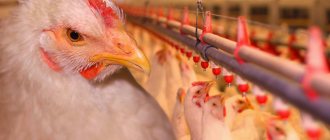Many residents of cities large and small, tired of many years of chasing money and stress at a job they don’t always love, increasingly began to think about how to earn money for themselves, completely managing their time and devoting themselves entirely to what they love.
However, when choosing a business area for yourself, often all desires come down to the question of where to get enough money to open a store, hairdressing salon or printing salon, where the initial capital can be quite significant.
One of these types of business, well known to many, is the breeding of chickens for the development of egg production. Eggs, as you know, are a universal product and are always in demand in cooking. Naturally, it is not very suitable for urban conditions, but with a little effort, a city resident can always find a small plot of land in nearby villages and small towns by purchasing or renting a dacha or something similar.
This article will talk about what kind of business to open with 100 thousand rubles, or rather, how to start your own business producing chicken eggs with only 100 thousand rubles, and what can ultimately come of it.
Where to start - calculating preliminary costs
Starting any business involves drawing up a business plan. Firstly, it helps to properly organize production, and secondly, if you need a loan from a bank, a competently drawn up document will only be a plus.
If we consider the fundamental factors for starting an egg business at home, we need to highlight the following:
- Decide on the area and type of chicken coop.
- If in the future you plan to develop your business and transform the business into a farming enterprise, then it is better to register as an LLC.
- Decide on the breed of laying hens and the quantity to get started.
- Resolve issues with business registration. Since you will be supplying food, you will definitely need to obtain permission from the relevant services.
We will consider all these questions in more detail below.
Paperwork
To legalize a business, you need to register the poultry farm as a business entity. Choose options:
- collective farming - KHL;
- individual entrepreneurship - individual entrepreneur.
If you raise chickens and produce eggs, you need permission from the sanitary service. To obtain it, provide a package of documents:
- certificate of state registration of the subject;
- extract from the Unified State Register of Legal Entities;
- taxpayer certificate;
- project documents;
- equipment list;
- approval of SES;
- BTI passport.
Construction and arrangement of a chicken coop
When planning a business on chicken eggs at home, you need to allocate most of the funds for the arrangement of the chicken coop, and here’s why: the quality and quantity of the product depends on the conditions in which the laying hens will be kept. Chickens should be kept in comfortable conditions and receive adequate nutrition. This way they won’t get sick, and you will get a good product that can be sold for good money.
The chicken keeping system itself can be purchased - such blocks are sold ready-made, with a feeding and watering system - they only need to be assembled at the installation site.
In general, there are two ways to keep laying hens: floor and cage. Floor maintenance is cheaper: there is no need to equip cages and systems for watering and feeding.
When setting up a chicken coop, remember that the room should be warm and dry during the cold season, this is the only way you will receive products all year round. To insulate the floor, you can use hay or straw - the layer should be at least 15 centimeters.
In general, when setting up a chicken coop to develop a chicken egg business at home, you need to consider the following:
- The height of the ceilings should be no more than two meters.
- The room should be equipped with a good ventilation system, but there should be no drafts.
- One nest should be equipped for 5-6 chickens - the number of places should be arranged based on this calculation.
- The nests should be located in a dark place.
- Perches should be made of wooden boards and beams. About 20 cm of perch is allocated per individual, the bars should be located 30-40 cm from each other, the height from the floor should be at least a meter.
- The area of the feeder for one chicken is 10-15 cm, the capacity (on average) should be 5-6 liters.
- The floor area should be calculated based on one square per 5 laying hens. The floor should not be concrete - bulk or wooden. There must be a layer of warm bedding.
- There must be enough light in the chicken coop. In the winter season, when it gets dark early, you need to install additional artificial lighting.
- The chicken coop needs to be thoroughly cleaned regularly.
- In the chicken coop, it is imperative to periodically install ash baths at a ratio of 1:1 ash and sand. This will be an excellent disinfection against parasites.
- The temperature in the chicken coop should be in the range of 23-25 degrees. In any case, it should not fall below 15 degrees.
Please note that in summer the extremely unfavorable temperature is 27 degrees or more. In the winter season, this factor is a negative indicator.
What they think:
“Sorry, of course, but your question is stupid. The cost of domestic eggs consists of many components, and it is different for everyone. The chicken coop, the feed, and the price of the chicken are different. The cost of your eggs will be approximately the same as the price of store-bought eggs, but these are homemade eggs! If you’re going to compare, you have to compare your price with the price at home.
On the other hand, what kind of savings do you dream of? Your family of two eats an average of 2 eggs per day, which means you will eat 60 eggs in a month. Even if your eggs are cheaper than store-bought ones, how much will you save? 50 rubles? A great help for the family budget! But chickens need care, albeit a little, but they need to be looked after!”
“It won’t be cheaper. But you will know exactly what you are eating and that there are no antibiotics or other chemicals in the meat and eggs. We got chickens this year. I sell surplus eggs. There is enough food. The cost of the chickens has not yet returned.”
As we can see, the opinions are approximately similar, but they do not have specific numbers. Let's do the math and determine: is it profitable to keep chickens for yourself or not?
Choosing a chicken breed
A chicken egg business will definitely be profitable if you choose the right breed. Among the abundance of representatives of laying hens, the following can be distinguished:
- Leghorn - produces about 300 eggs per year, weighing on average 55-58 grams.
- Loman Brown - about 320 light brown eggs per year.
- Hisex - produce about 320 eggs per year, average weight 65-70 grams. These eggs are considered dietary.
- Neugenbraun – 350 eggs per year, average weight 61 grams.
- Easy Brown - average 342 eggs, average weight 61.6 grams.
- High Line - 336 eggs per year, average weight 61.9 grams.
- Super Nick - 330 eggs, average weight 62 grams.
- Bovans - about 320 eggs with an average weight of 62.7 grams.
On average, a laying hen produces the product for about 2 years. After this you need to update the birds.
Tax system
This business relates to the production of agricultural products, therefore a taxation system for agricultural producers, the so-called single agricultural tax, is applied.
(ESKHN). The main condition of this tax is that the proceeds from the sale of these products are at least 70% of the total revenue, and also that the enterprise must be engaged exclusively in the production of agricultural products, and not in their sale. Professional business plans on the topic:
- Poultry farm business plan (16 sheets) - DOWNLOAD ⬇
- Business plan for an ostrich farm (17 sheets) - DOWNLOAD ⬇
Purchasing young stock
It is better to purchase those breeds that are intended specifically for making eggs. To begin with, it is better to take several dozen raised young animals, but in general, the number of laying hens should be selected based on the dimensions of the chicken coop, not forgetting the above proportions.
It is recommended to buy chicks at 2-3 months of age - this way you can eliminate the possibility of errors in gender differences. But, it is quite possible to purchase and resettle older laying hens - 5 months of age.
Important - chickens must be vaccinated. Therefore, it is better to buy young animals from a trusted supplier.
Question
“Please tell me, does it make sense to keep and raise chickens for a family of two people, or is it cheaper and easier to buy eggs and poultry meat in the store? Maybe someone has a list of costs and other data that will help decide whether to start this or not? Interested in: costs of building a chicken coop, food, vitamins, care, medicines.”
The question is correct, because in numerous naive videos, “poultry farmers” only count the cost of feed (mainly in the summer months) and egg production at its peak, when the chicken is in ideal conditions. In reality, all this does not look so rosy. The breeding cycle of poultry includes both winter and molting, when chickens do not lay eggs at all. And also, do not forget about the energy costs for heating and lighting the chicken coop, about diseases and deaths of birds.
Care and maintenance
Care and proper feeding are two fundamental things that will provide the chickens with a comfortable life, and, therefore, a good product for you. When arranging a chicken coop, you need to consider the following:
- The walls should be treated with lime.
- It is imperative to maintain optimal temperature conditions - not below zero and not above 27 degrees. Do not forget that during the cold season there should be warm and dry bedding.
- Once every three months, the premises must be completely disinfected.
- There must be a container of ash and sand - this is a bath for cleaning from parasites. Chickens do this on their own without any problems.
Breeding laying hens for eggs as a business is quite a profitable business if you approach it wisely.
Features of feeding
The diet is a separate article in the business plan, since there should be no savings here. But, in fairness, it should be said that feeding laying hens is not an expensive expense item.
Based on one head, per day you will need:
- Grain - barley, oats, wheat, etc. - 50 g.
- Flour mixture – 50 gr.
- Hay flour – 10 gr.
- Juicy feed – 30-50 gr.
- Animals and protein feeds – 10-15 g.
- Bone meal – 2 gr.
- Shell – 5 gr.
- Table salt – 5 gr.
You can also periodically give eggshells in their worn form.
Meat birds
Broilers are considered the most suitable for poultry farming. As mentioned earlier, these crosses were bred from meat breeds by crossing the best individuals. These birds reach a body weight of 2 kg faster than others. Their meat has unsurpassed taste.
Chickens are bought at one day of age and placed in special boxes and cages with a density of 15 - 20 birds per square meter, with a temperature of 30 degrees. Every subsequent day the temperature drops by 1 - 2 degrees, eventually reaching 17.
The bird is fed 6-8 times a day. For intensive growth, a large amount of grains, premixes and stimulating additives are given. 9 - 12 - week old young animals go to slaughter. By this age, a mass of 2 - 2.5 kilograms of net weight is reached.
Of all the broiler crosses, four can be distinguished as more successful in terms of productivity and quality: broiler 61, COBB 500, ROSS-301, ROSS 708.
The nutritional value and taste of broilers is higher than that of other farm birds. There is always consumer demand for carcasses. In many regions, demand for poultry meat significantly exceeds supply. End customers are willing to pay more for it than for similar factory products. Broilers are sold at markets, fairs, and retail outlets.
Rules for breeding laying hens
Breeding laying hens for eggs as a business will be profitable only if the “base” is chosen correctly, that is, chickens. Therefore, when choosing, you need to remember a few fundamental rules:
- Special attention should be paid to the rooster - for every 5 hens there should be one young, strong male.
- The chicken's comb should be large and bright red - this is a sign of a good laying hen.
- A large soft belly is a sign of fertility.
- For laying, you need to choose clean and properly shaped eggs.
Hatching and incubation
Let's look at this sub-item more carefully. Many people starting a chicken egg business believe that it is better to just buy chickens. In fact, this is exactly how there is a big risk in buying crosses - those types of chickens that will produce a good product only in the first generation.
The best option would be to breed young animals yourself, especially since it is not difficult to do. Natural incubation means the case when a hen independently hatches eggs, takes care of the chicks, teaches them to find food, and so on.
If it so happens that the laying hen is not suitable for the role of mother, then you need to resort to an incubator. The incubation period lasts 21 days, out of 100 individuals approximately 80 survive.
Let's learn from other people's mistakes
You need to evaluate the opportunity to work for a long time and learn to do everything yourself. Farming business is not easy. Any project takes a lot of time. There is no need to try to start with a big project right away. 100 laying hens are a lot, take 20 or 30. First, feed yourself and your loved ones. Only after you gain experience on small volumes, expand production. Don't just sell one product. In agriculture, everything can be profitable. For a chicken coop this is an egg, chickens, pullets, meat, feathers, poultry slaughter waste, poultry waste, droppings. Even excursions can be turned into a business.
Use hired labor only as a last resort. When production is already established. You need to treat your work with love. For you this is a native bird, for a hired employee it is a stranger. No one but you can debug the entire process. When sales grow and production improves, it will no longer be possible to keep up with everything - then invite assistants. Then you can register an individual entrepreneur and move to the professional level.
Be careful with your feed. It depends on the food how your pets will feel. How delicious will the eggs be? Work for a regular, not a casual customer. If you manage to create your name, the product will sell well.
Take the time to present your product beautifully. Look for non-standard ways of implementation.
Recently, online sales have become widespread. Direct connection between producer and consumer. You can form a group based on interests and work for specific buyers.
The farm should be clean and look beautiful. Many buyers will come to buy the eggs themselves.
Risks when keeping laying hens
Breeding laying hens for eggs as a business has its risks, just like any other business venture. So, in this case, the main negative factor is diseases of laying hens, due to which the entire flock can die.
To prevent this, or at least minimize the risk of such a situation occurring, you should:
- Give complete fortified food.
- Systematically disinfect the premises.
- Carry out regular vaccination of birds.
- Consult a veterinarian on all issues and periodically call a doctor to the site for a preventive examination.
- At the slightest suspicion of a disease, you should urgently call a veterinarian.
In general, you need to follow one, but fundamental rule: monitor the health and nutrition of the laying hens and everything will be fine.
Organizational aspects
When planning the purchase of feed, you should assume that one chicken consumes approximately 5 kg of feed per month. To reduce feed costs, purchases should be made during the grain harvesting season. You need to take it with a reserve so that it lasts for six months or a year. To get good egg production, it is advisable to provide each chicken with a perch of at least 30 cm. At least once a month, you should do a general cleaning of the poultry house. If you plan to independently reproduce the flock (buying young animals every time is too expensive and an unjustified pleasure), then a room or department for keeping chickens should be provided in advance. The conditions for keeping young birds and adult birds are very different. So, day-old chickens require a temperature of at least +29 degrees, and adults - no more than +18 degrees. The heating issue can be solved using infrared lamps.
Expenditure part
When drawing up a business plan for breeding laying hens for eggs as a business, you definitely need to calculate the expenses. At the initial stage, funds will be needed for:
- Purchase of equipment.
- Purchase of young animals, an incubator for future chickens.
- Purchase of feed and vitamins.
You will also need to separately calculate the arrangement of the chicken coop itself, if there is none.
The average price for 100 heads of young animals is 7,000 rubles, and this expense item can be classified as a one-time expense. As for food, it will cost about 3,000 rubles per month.
Thus, you will need about 25,000 rubles for initial expenses if you do not have to build a chicken coop from scratch. So the chicken egg business can be called the most budget-friendly.
Step-by-step plan for organizing a business on a chicken farm
To successfully implement a project from scratch, you need to have a clear algorithm of actions - this way the risks of bankruptcy will be minimized. The step-by-step plan includes the main tasks:
- analyze the domestic market and the level of competition in the region;
- monitor prices for equipment, feed, young animals;
- calculate the costs of starting a mini-farm, make an estimate of current expenses;
- register a business;
- find distribution channels;
- give a profit forecast, determine the profitability of the project;
- find a room;
- equip a poultry house;
- purchase young stock;
- start egg production.
Calculation of estimated income
Chicken eggs, as we said above, are a popular product that is needed both in its pure form and for the manufacture of other products and dishes. Income will directly depend on the following factors:
- Poultry egg production.
- Diet.
- Content.
Therefore, you need to choose a good breed and monitor its maintenance.
The approximate income part looks like this:
- From 100 chickens per day you can get about 70 eggs, therefore, about 2.1 thousand per month.
- The average price of an egg is 10 rubles, which means the income portion is approximately 18,000 rubles per month.
The payback period for a chicken egg business occurs on average in 2 months.
General provisions
Chicken eggs are a popular product for all categories of citizens. The quail product is more difficult to sell because it is aimed at the consumer, but if you advertise it correctly, positioning it as a healthy product used for medicinal purposes, as well as in preparing gourmet restaurant dishes, then there will be no problems with buyers.
An egg business can be built from the perspective of resale of eggs purchased at a favorable price. A more profitable option is to raise poultry to sell its products. If they are obtained from your own poultry farm, the cost of production will be lower, but you will have to invest more money in the business.
Is it profitable to maintain a mini-poultry farm at home?
Homemade eggs are definitely more in demand than those supplied from industrial poultry farms. Such a business can confidently be called profitable because:
- The product is in demand.
- You don't need a lot of investment in start-up costs.
- This type of business is perfect for those who have their own house in the village - they already have a room for setting up a chicken coop and a place for raising chickens.
In addition, over time, the chicken egg business can be “expanded” and additionally engaged in the breeding of broilers for meat.
Purchasing an incubator
Reproduction of poultry requires the use of an incubator. For the most part, this is Russian equipment - the ILB-0.5M incubator for 770 eggs. Chick incubation time is 21-22 days. However, this technique is already for farms that are reaching a more significant high level.
For a small personal farm, for example, the Norma Park incubator for 120 eggs with automatic rotation , hygrometer, humidity control and digital electronics and uninterruptible power supply, switching power to battery power at the time of a power outage is suitable. The incubator, along with chicken eggs, can be used for duck, goose and quail eggs. Price 13,999 rub.
An incubator for 500 eggs can cost up to 40 thousand rubles.
An industrial farm incubator with automated control for 528 eggs of the ECO-528 brand costs 37,500 rubles.
Sales of products
At the initial stage, when there are not particularly many eggs, you can simply sell them on the market, which, in fact, is what most rural residents do. When increasing volumes, you can already rent a point on the market, but in this case you need to take care of registering an individual entrepreneur. LLC status for this type of business will only be needed if you set up a large farm.
Subsequently, when the volume of product supply is large, you can enter into an agreement with supermarkets, grocery stores, and public catering establishments. But please note that volumes and deliveries must be regular.
How much money do you need to open a poultry farm?
Now let's move on to calculating the efficiency indicators of a poultry farm. Is it worth doing this business at all? We will calculate based on a population of 500 chickens. We will assume that we already have a room for keeping poultry.
- Arrangement of a chicken coop (electricity, ventilation, insulation, etc.) – 90,000 rubles.
- Purchase of a household incubator – 10,000 rubles.
- Purchase of cage batteries for 500 heads. – 200,000 rub.
- Purchase of young chickens at one month of age - 100,000 rubles. (200 rub./goal)
- Feed supplies – 15,000 rub.
- Other expenses (vitamins, supplements) – 10,000 rubles.
Total – 425,000 rub.











